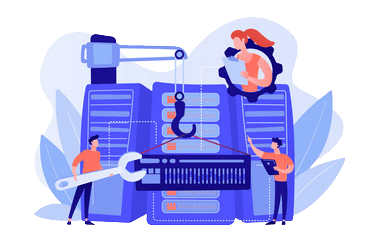Product & Platform
Engineering


Does your organization frequently develop software? But have you ever wondered how complex things could sometimes get for the developers?
Well, that’s where product and platform engineering comes into play. It is a great way to help developers self-serve themselves into creating efficient software solutions. Moreover, if your organization works in a cloud environment, product and platform engineering is all you need to automate and optimize the software development life cycle.
We at iTechOps, provide you with the most efficient tools and frameworks as a part of platform engineering. This transforms the software development and deployment experience of your developers.

Fast development cycles
The product and platform engineering solutions we offer go all the way towards speeding up the development cycles for your software. It is all due to the automation and optimization of the software code pipelines with integrated test cases. This automated development process helps deploy the codes faster and cuts down manual tasks, thus making your development cycles faster than ever.
Shed off the operational complexity
The main aim of platform engineering is to reduce the operational complexity of software development. With self-service infrastructure deployments, developers need not rely on the DevOps team. The DevOps cycle gets automated, giving them an upper hand towards productivity. Overall, it sheds the burden on your organization as far as software deployments are concerned.
Enhanced product development experience
The best part about product and platform engineering is that it transforms your organization's product development goals and takes them to a higher level. Our platform engineering solutions are useful even if your organization needs more highly skilled developers.
The developers no longer have to master the underlying complexities of software development, which are beyond their skills. The process becomes smooth with high flexibility for deploying code to any environment. So, your business solutions are sure to impress your customers.
Do You Need Product & Platform Engineer?
We at iTechOps, provide you with the most efficient tools and frameworks as a part of platform engineering.
Talk to a Product & Platform Engineer ExpertFAQ
Why is it important to have product and platform engineering in an organization?
- Any organization must develop and maintain its technological backbone. Product and platform engineering supports the company's product or website. It involves activities like building and optimizing the software infrastructure and frameworks. It also supplies tools that support creating and delivering products or services. Having this department ensures technological alignment with business goals. It also ensures user experience, scalability, and innovation
How does Product & Platform Engineering differ from traditional software development?
- Traditional software development focuses more on the creation of specific applications or features. Product and platform engineering, on the other side, looks into a broader view. It handles building robust, scalable, and reusable components, frameworks, or systems. Such a system can support many products and services at the same time.
What are the key roles of product and platform engineering in an organization?
- Product and platform engineering plays a significant role in success, growth, and ability to innovate in today's competitive landscape. Product and platform engineers are responsible for a variety of tasks, such as:
- Architecting scalable systems,
- Designing core frameworks,
- Assuring product compatibility,
- Maintaining platform health,
- And integrating new technologies.
What is the role of product and platform engineering in the growth of an organization?
- Product and platform engineering has a significant impact on the growth of an organization. It helps an organization to grow by:
- Accelerating product development cycles,
- Ensuring scalability to handle increased user loads,
- Reducing time-to-market for new features, And fostering innovation through reusable components
What skills must one have to get a career in product and platform engineering?
- If you are someone looking to have a career in product and platform engineering, you must have skills like:
- Technical expertise and strategic thinking.
- Skilled in programming languages,
- software architecture,
- system design,
- cloud computing,
- and knowledge of industry best practices.
- Moreover, strong communication skills and a collaborative mindset are also crucial. It helps you grow cross-functional teamwork.
